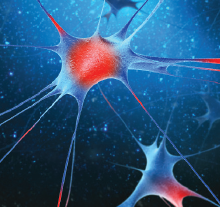Sodium Benzoate Augments Clozapine Therapy
Adjunctive sodium benzoate may improve the symptoms of patients with treatment-resistant schizophrenia, reports a study published in Biological Psychiatry.
Sodium benzoate, which is commonly used as a food preservative, is known to inhibit D-amino acid oxidase, an enzyme that oxidizes several important neurotransmitters. Previous studies found that patients who take sodium benzoate in addition to antipsychotics have better outcomes than those taking antipsychotics alone. Chieh-Hsin Lin, M.D., Ph.D., of Taiwan’s Chang Gung Memorial Hospital and colleagues tested this agent as an add-on to clozapine.
Sixty hospitalized patients with schizophrenia who had been stabilized with clozapine were randomly assigned to receive adjunctive 1 g/day sodium benzoate, 2 g/day sodium benzoate, or placebo for six weeks. After six weeks, both groups receiving sodium benzoate showed greater improvement in their Scale for the Assessment of Negative Symptoms scores compared with patients who received placebo. The patients receiving 2 g/day sodium benzoate also experienced greater improvement than placebo in their Positive and Negative Syndrome Scale (PANSS) total scores, PANSS-positive symptom scores, and quality of life measures. There were no differences in PANSS negative symptom scores or cognitive scores between the three groups.
Sodium benzoate appeared to be well-tolerated, and patients did not develop any serious adverse effects.
“Further study is needed to investigate whether higher doses could be beneficial for cognitive function, although the risk of seizure or other potential side effects may be increased when combining higher doses of sodium benzoate with clozapine,” the authors wrote.
Immune Protein May Mediate Cocaine Response, Animal Study Suggests
Researchers at Icahn School of Medicine at Mount Sinai have found that an immune system protein known as granulocyte-colony stimulating factor (G-CSF) may mediate the desire to take cocaine. Their findings were published in Nature Communications.
Previous research has pointed to a link between cocaine use and altered immune responses in both animals and humans. Here, the researchers conducted a broad screen of immune-related compounds from blood samples of mice exposed to cocaine. Compared with mice given saline, mice that that were repeatedly given cocaine showed higher concentrations of G-CSF.
The researchers next injected G-CSF into the brain reward centers of mice (the nucleus accumbens and prefrontal cortex). They found that mice receiving the G-CSF injections demonstrated more drug-seeking behavior and motivation to self-administer cocaine compared with mice who received saline injections. Mice given G-CSF did not show any increased motivation for sugar water, however, suggesting that this protein acts specifically on cocaine-related pathways. Injecting an antibody that neutralizes G-CSF in the brain appeared to block cocaine’s behavioral effects.
The study authors noted that if these findings translate to humans, they represent a potential therapeutic approach to help people with substance use disorders without introducing a potential new substance for abuse.
How Cholesterol Contributes to Age-Related Neuron Impairment
Higher levels of cholesterol may impact the ability of neurons in older individuals to repair their protective myelin coatings following damage. Once the fatty myelin sheaths are compromised, neurons are less efficient and at greater risk of degeneration.
In a study published in Science, researchers at Germany’s Max Planck Institute and colleagues induced brain lesions in both young (3-month-old) and old (12-month-old) mice to compare the repair processes.
They found that the white blood cells that clear up myelin debris in the brain are overloaded with cholesterol in older mice (myelin is rich in cholesterol). Eventually this cholesterol buildup can cause the cells to rupture, triggering inflammation and leading to more damage.
The cells of younger mice were better able to clear damaged myelin, but if the researchers knocked out a key cholesterol transporter in young mice, they also had a reduced ability to remove damaged myelin and repair the sheaths. However, if mice were given an experimental compound called GW3965, which improves the flow of cholesterol in and out of cells, their ability to repair nerve damage improved.
The researchers noted this link between lipid metabolism and tissue repair opens the possibility that drugs designed to promote cholesterol clearance may also be good candidates for therapies that can improve brain recovery after damage.
Serum Caffeine Levels May Identify Parkinson’s Early On
A study from a research team in Japan suggests that the levels of caffeine and caffeine-derived metabolites in the blood might be good diagnostic biomarkers to identify people with early stage Parkinson’s disease (PD).
Previous research has suggested that daily caffeine consumption may reduce the risk of developing PD in men, and in women not taking hormone replacement therapy. In addition, caffeine supplements have been shown to improve motor symptoms in some patients.
The team, from Tokyo’s Juntendo University School of Medicine, analyzed the serum levels of caffeine and its 11 metabolites from 108 PD patients and 31 age-matched healthy controls. Participants in both groups consumed a similar amount of caffeine daily (~110 mg/day). There were also no significant differences in the frequency of genetic variations in the two enzymes that primarily metabolize caffeine (CYP1A2 and CYP2E1) between the two groups.
The results, reported in Neurology, showed that patients with PD had significantly lower absolute levels of caffeine; 9 of the 11 metabolites assessed were also significantly lower in the PD patients. The metabolite levels in the PD patients were not related to overall disease severity; however, there was an association between lower caffeine levels and increased motor problems.
The authors noted these results provide further evidence that caffeine offers some neuroprotective properties.
Exposure to Humanities Improves Empathy and Reduces Burnout Risk
An online survey of 739 medical students at five medical colleges across the United States suggests that spending more time participating in arts and humanities activities can increase empathy and reduce the risk of burnout.
The survey participants were asked to rate their exposure to artistic activities such as music or theater. They also answered a series of questions related to personal qualities including empathy and physical well-being.
Students who reported more exposure to the humanities scored higher in several positive traits including empathy, wisdom, emotional appraisal, and tolerance for ambiguity. Those who reported less exposure to the humanities were more likely to report greater fatigue, emotional exhaustion, or other traits associated with burnout.
“The humanities have often been pushed to the side in medical school curricula, but our data suggest that exposure to the arts are linked to important personal qualities for future physicians,” said senior author Marc Kahn, M.D., M.B.A., of the Tulane University School of Medicine. “This is the first study to show this type of correlation.”
These findings were published in the Journal of General Internal Medicine. ■





